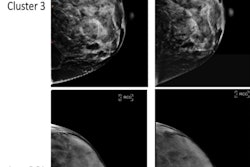Many breast imaging patients are undecided on whether AI has benefits in healthcare, according to findings published May 6 in the Journal of the American College of Radiology.
Researchers led by Brian Dontchos, MD, from the University of Washington in Seattle found that while around half of the surveyed women are undecided, those with higher electronic health literacy, more education, and younger age were more likely to have optimistic feelings toward the technology.
“As AI is increasingly implemented into clinical workflows, it is important to educate patients and provide transparency to build patient understanding and trust,” Dontchos and co-authors wrote.
Patient beliefs about AI have varied among patients since the technology became more integrated into clinics. In breast imaging, previous survey studies suggest that many women are open to having AI as an adjunct for their mammograms and that women with knowledge of the technology are more open to having AI involved in their cancer screening exams.
Through a multisite survey, the Dontchos team sought to understand patient perceptions of AI. The survey included 3,532 completed responses from eight U.S. practices in 2023 and 2024. The respondents had a median age of 55 years, most were white (73%), and most had a college-level education (77.3%).
Overall, respondents were undecided on questions regarding general perceptions of AI in healthcare. This included a range of 43.2% and 50.8%.
Respondents with higher electronic health literacy, more education, and younger age were significantly more likely to consider AI useful for helping in medical tasks (all p < 0.001). The opposite went for respondents with lower electronic health literacy and less education, who were more likely to express pessimism toward AI performing medical tasks (p < 0.001).
Nonwhite patients were more likely to express concerns that AI will not work as well for some groups compared to others (p < 0.05). Overall, favorable opinions of AI use for medical tasks were associated with younger age, more education, and higher electronic health literacy.
The authors suggested that medical providers should understand public concerns about AI and focus educational efforts on addressing mistrust in the technology.
“As integration of AI into radiology practices grows, care delivery will inevitably progress, and providing patient education in this evolution will hopefully support compliance and trust,” they wrote.
The full study can be found here.



















